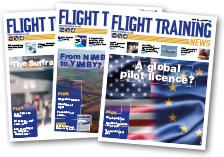After around seven weeks of inactivity, on 15th May, UK General Aviation (GA) pilots were informed that they can return to flying, subject to following the general guidance on social-distancing. In effect the guidance is that GA flying is currently restricted to either solo flight, or flying with passengers that are part of the same self-isolating group as the pilot.
At face value, this means that flying training cannot yet recommence, and the Department for Transport (DfT) guidance states: “Whilst noting that online training and socially-distanced training on the ground can take place, the inability to undertake training flights will mean that some pilots will not be able to resume flying until further easing of restrictions is possible. We advise those affected in this way to monitor this page and wider government guidance for further updates”.
At the current time, this guidance applies to England only and recreational flying is still not permitted in Northern Ireland, Scotland and Wales, where public health and safety requirements differ.
However, shortly after the updated government advice was released, FTN learnt that a UK flying school providing commercial pilot training courses will be recommencing flying activities over the next ten days, having gained a letter of ‘no objection’ from the CAA, apparently in direct contradiction to the DfT’s latest statement.
FTN contacted the DfT to ask for an explanation, and a new statement was made by the DfT: “Organisations are allowed to conduct training in this sector because commercial pilots/crews are viewed as ‘critical workers’ and are needed to maintain cargo and repatriation flights, and other essential aviation transport services. We have adopted a similar approach to the operation of driving schools where lessons and tests continue to be allowed for critical workers, but are suspended for all other candidates. …this permission does not extend to instructional flight for pilots pursuing a General Aviation licence for recreational purposes
“…this permission does not extend to instructional flight for pilots pursuing a General Aviation licence for recreational purposes, shared recreational flights (other than with another member of the pilot’s household), or to other aviation activities sold on a commercial basis such as experience flights in vintage aircraft. However, the Government is keeping the situation under review and we will provide updated guidance as and when adjustments to social-distancing measures allow the current restrictions on these activities to be altered or lifted.”
Leading Edge Aviation (LEA) is the flight school resuming flying training. Based at Oxford Airport, LEA told FTN that rather than seeking approval, the company instead asked the CAA if it has any objection to them re-opening under new carefully created social-distancing measures and on 14 May 2020 the Authority confirmed that they held no objection.
In the wider GA community, probably the largest flying training operation to re-open in the UK over the weekend of the 16-17 May was Lasham Gliding Society. CFI Colin Watt told FTN that LGS had prepared new operating protocols and risk assessments in anticipation of a change in the guidance on recreational flying, and so on the Friday afternoon they were able to act as soon as the DfT announcement was made. Lasham decided to restrict the number of gliders that could launch on Saturday to around 40, rising to around 55 on the Sunday. This ‘soft start’ worked well with pretty much all pilots observing the new protocols and standard social distancing. The single exception was one individual visiting from another club who got too close to another person, but was held-off by the warning ‘Space Invader”! As Colin commented, social distancing has now been in place for around eight weeks and so is second nature for just about everybody. The other good news is that having notified the local parish council that flying would re-start over the weekend, LGS have not received a single noise complaint.
It has been argued that to some extent the GA community has been its own worst enemy during the pandemic by asking impossible questions of its regulator. As one flying school operator told FTN, short of getting the CAA to require cadet pilots to shack-up with their flight instructors, there is no new regulation that the CAA can impose on the flight training industry to get it back to work. The GA experience appears to be that hard work and liaison with the regulator by the aviation industry associations, together with individual initiatives such as by Leading Edge, is the quickest route to recovery.
The question now is how long will it be before ‘recreational’ flight training can resume. After-all, the DfT has already issued guidance permitting other ‘close-contact’ situations (for example driving tests for key workers, and car sharing to get people to work). With commercial flight training also now underway, it would seem that the flight training industry, and not least the LEA initiative, is leading by example.
Read the full story in this month’s print edition of FTN.
UPDATE: Shortly after going to press with the print edition we were informed that another UK approved training organisation, Stapleford Flight Centre, were putting plans in place to resume flight training from the beginning of June.







